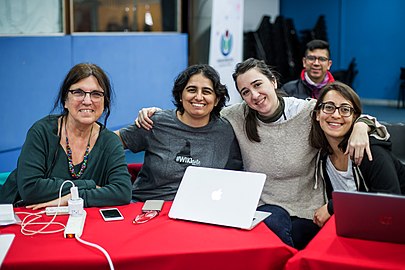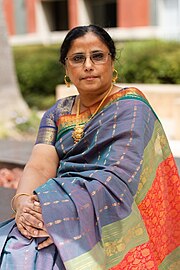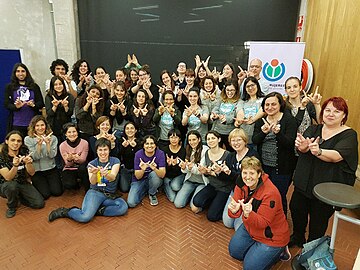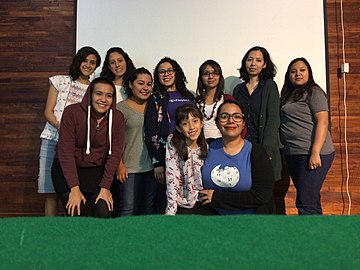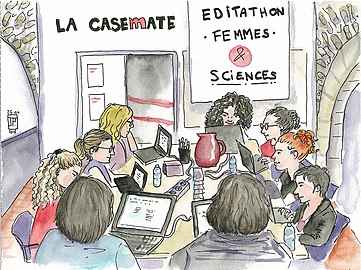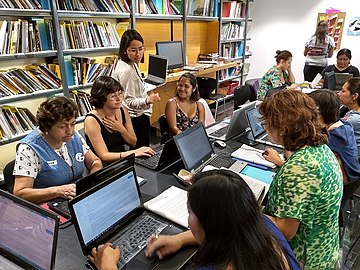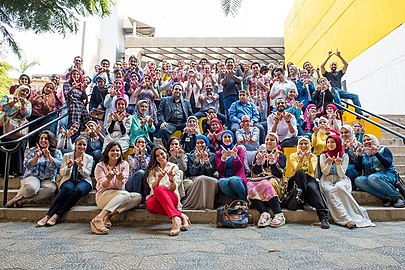Gender equity report 2018/Inspiring change

The interviewees for this report are among the most active leaders advancing gender equity on Wikimedia projects. As they seek to expand the Wikimedia movement's capacity to understand and support gender equity, what is the vision that drives their efforts? As it turns out, they have many visions. Interviewees are motivated by a variety of ideas about the future they are working to create. Here are some of the responses gathered from their interviews:
- "Consciousness raising around free knowledge, digital labor, being female online, more expansive understanding of gender expression, etc."
- "People are saying they do activism for Wikipedia. I don’t do it for that, I do it for women on the internet. I’m a librarian and I think strongly about women and representation, and that’s not on the internet or on print resources. So if any small way we can add content each year, we are chipping away at the patriarchy."
- "Everything I do on wiki, it is for my future, my country, my people, my state. When I share these histories, I think this is very important. It’s about doing connections."
- “People who can get more people to contribute should be the new rock star. Mentoring new people should be something we cherish at least as much as a million edits. Impact on the wider public will come as a natural next step. It’ll be even easier for others to change when we are more welcoming; when new people aren’t considered a nuisance.”
- “I want to dispel the myth that gender focused programs are garbage. Women feels belittled by this. People feel heartened by this. We feel specifically welcome, and that’s important to have a space. You, with your identity are welcomed here. We care about your voice. It’s stuff like WikiProjects, and Art + Feminism, and workshops. It’s also about women finding each other and their friendships."
- "Expansive understanding of what a participant is (showing support online, just showing up, don’t have to edit). Meeting people where they are in terms of skills and time. Acknowledging and celebrating everyone’s contribution no matter what it is. Not creating a hierarchy of participation."
- “The project is so intriguing that everyone wants to participate. Try to create stories of the missing: women and queer, marginalized communities, also of different gender."
Interviewees have initiated many projects to implement their vision of greater gender equity on Wikimedia projects. The gallery below presents only some of them. Click on the links in the subtitles to explore the wide range of work they are doing to increase editor diversity, decrease the gender gap in Wikimedia content, cultivate supportive and inclusive communities, and transform cultural awareness about gender equity,
Measuring the impact of gender diversity efforts is difficult. We can relatively easily track and measure impact in terms of content on the Wikimedia projects, but understanding changes in participation, community health, and the more transformational aspects of this work is a challenge. However, from the data and stories being collected we believe we are making progress.
Content[edit]
A number of tools have been created over the last several years to help program leaders track efforts aimed at improving and increasing the number of gender diverse articles. The ability to track page views is especially helpful, as we get a better sense of how relevant and useful the content is. Here are a few examples:
- Women in Red: Since July 2015, editors have created 78,961 articles about women in the English Wikipedia.
- The women you never met: In just one month, 114 editors in the Ibercoop region created or improved 4,680 articles that have been viewed 25.5 million times in the last three months.
- Art+Feminism: Over 4,000 people at more than 275 events around the world participated in Art+Feminism’s fifth annual Wikipedia Edit-a-thon. They created or improved nearly 22,000 articles on Wikipedia, almost four times the output of the 2017 events. These articles have already been viewed 75.5 million times.
Participation[edit]

Editors on Wikimedia projects are not required to disclose their gender identity, and this anonymity contributes to a sense of safety for many. Even among editors who voluntarily disclose their gender, we have no way of determining whether changes in participation can be attributed to the gender diversity projects conducted across the movement. Nevertheless, we know that there are preliminary indicators that gender diversity is improving, at least on some projects.
Relative to the number of people that do not disclose their gender identity, those who do disclose are a very small group. However, we can still see some trends by tracking changes over time. For example, on the Hebrew Wikipedia in 2011, the percentage of new editors identifying themselves as female was 21%, in 2013 it was 46%, and in 2015 it was 53%. These years coincided with Wikimedia Israel’s outreach efforts around education, GLAM, and the organization of a WikiWomen group. Similarly, Wikimedia Armenia increased their education outreach efforts in 2014, a program that typically includes a high percentage of female students. Since then, the percentage of new editors identifying as female on the Armenian Wikipedia has risen from 36% to 50%.
Offline participation can be tracked more easily, but it takes a lot of effort to understand what happens after an individual participates in a single event. Do they continue to edit on the Wikimedia projects? Do they take on leadership roles in their affiliate? Do they do awareness work to bring in new readers? Do they volunteer in other ways that are not as visible? One promising example of offline participation is the Egyptian education program. In its last term, 90% of the students who participated identified female. Over the years, one program participant has gone on to become an administrator on the Arabic Wikipedia (one of only three female admins) and a group of others have developed into leaders in their community, the international Wikimedia movement, and have served as respected ambassadors outside our movement as they develop partnerships with like-minded organizations.
Impact is not only about content and participation. It is about developing community, creating safe spaces, changing perceptions, building allies, improving community health, and much more. We as a community need to discover better ways to understand the impact of this important work and share our stories. It is essential for understanding where we've been and how much farther we have to go.
| “ | The ways we measure how success looks like is transactional (content, people, communities themselves); and then there’s a deeper layer: transformational. How do we work with tech, GLAM world, the Wikimedia Foundation so that knowledges of the world, those who embody this knowledge, is meaningful? And then how does that transfer to what we embody in Wikimedia: knowledge is global. | ” |
In spite of the work being done across the globe to advance gender equity in the Wikimedia movement, much more remains to be done. One of the goals of this report is to raise awareness about existing efforts, and to share insights into what is working and what isn't, in hope that it will both inspire more Wikimedians to work actively to advance gender equity in their own communities and connect them with the means to do so. If you would like to join this effort, we encourage you to use the links in the gallery above to explore some of the many different ways you can help.

